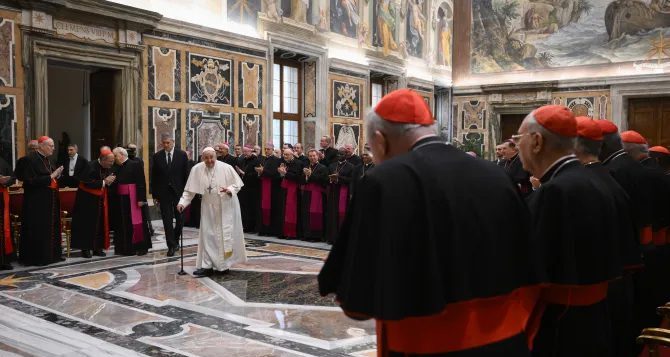When Helen Hull Hitchcock slipped into eternity in October, the Church lost a faithful, holy, and zealous Catholic who gave up much to accomplish great things for the Lord. Helen was the beloved wife of Dr. James Hitchcock, the renowned Church historian. She is the mother of four (now grown) girls, Alexandra, Consuelo, Hilary, and Louisa. She was also a dear and faithful friend. But it may be surprising to learn that Helen was an intelligence agent and intelligence analyst for the Catholic Church. Like every spy, Helen knew that carefully sizing up the opposition and accurately reporting their activities and identifying the appropriate consumers of the news was the key to a good intelligence network.
Early in the 1990s Catholic World Report had an article reporting that the International Commission on English in the Liturgy (ICEL) was revising the English translation of the Roman Missal. The effort was a means to “update” the existing notoriously deficient translation and replace it with a new, politically correct so-called inclusive language translation, usually devoid of a sacral vocabulary. Even the revered Lord’s Prayer was to be updated to be compatible with “modern sensibilities.”
As a newly ordained priest of two years, I was horrified. So were several other priests. On a shoestring budget, a small group of us launched CREDO: A Society of Priests Dedicated to the Accurate Translation of the Liturgy. At the time, we had little expectation that we would have much influence, but we thought it was important — with our “peashooter” information news- letter — to take a stand. With a little bit of luck and God’s grace, perhaps we could, as they would complain of traditional candidates in progressive seminaries, “disrupt the process.” To some extent we did, but we needed the help of a spy.
The small group of priests grew to 2,000, including representatives from England and Australia. We added another 3,000 “lay associates” for purposes of prayer and financial support. Seminary professors wanted to receive updates. Even Cardinal Avery Dulles sent in his application.
The internet was in its infancy in the early 1990s and accurate information continued to come at a price. Translation scholars were also attracted to CREDO, and offered alternative — accurate and beautiful — translations to the effort. CREDO repack- aged the draft translations of the liturgical texts and sent them to bishops before their semiannual meetings. Many bishops used the CREDO critiques during the then-NCCB (National Conference of Catholic Bishops) meetings.
To our surprise and delight, the approval process of the politically correct ICEL translations slowed down. The “process” was “disrupted’’ and the original plan to release a new translation by 1995 was delayed.
Helen worked with CREDO — well, with me — behind the scenes. When we launched the organization I had no idea that Helen was already at work on the translation crisis, although I remember being a fan of her “USCC Watch” column in the Catholic monthly Crisis. Her columns were true intelligence reports on the inner workings of the bureaucracy responsible for much of the mischief in the Church. She already was editing one of the most important critiques of feminism in the Church, The Politics of Prayer (Ignatius Press, still in stock). Her book documented the transformation of the language of worship. The (truly diabolical) movement began almost imperceptibly with relatively peripheral liturgical elements, such as prayers incorporating approved feminist language and concepts, and with “corrected” lyrics to existing hymns and words of prayers. But this movement would not escape the keen eye of Helen.
Around the time of her conversion to the Catholic Faith in the early 1980s, Helen co-founded Women for Faith & Family (WFF), in part to counter the feminist agenda. Helen spent a good deal of her life demonstrating that the feminists’ battle against “oppressive, patriarchal” religion had developed into an all-out attack on the Scripture and on the core beliefs common to both Christianity and Judaism — essential beliefs about the nature of God, of the nature of mankind’s “imaging” of God, of the meaning of human sexuality, and of the relationship of men and women with one another and with God. (The preceding sentences were plagiarized from the Ignatius Press site, and probably written by Helen herself.)
Helen’s work was that of identifying the “who, what, where, when, and why” of the politics of prayer. It was a daunting and thankless task at a time when the average Catholic simply assumed the goodwill of anyone with a position of authority in the Church.
With my CREDO peashooter I caught the attention of Father Joseph Fessio, SJ, publisher of Ignatius Press. He directed me to Helen, who became, in effect, my editor. With Helen, I attended the NCCB meetings in Washington and took detailed notes. My notes were never as detailed and as nuanced as Helen’s. So when I wrote the newsletters, I was careful to allow Helen to critique them. Helen squeezed out errors in grammar, inaccuracies, imbalances, and sarcasm (the latter sometimes to my chagrin).
Helen also convinced me that the Holy See — in the internet infancy days — really could not obtain enough accurate information on the liturgical proceedings in the United States. In an email exchange (dial-up Compuserve, remember those days?) with Helen and others I learned that accurate information was “gold” in the eyes of many Vatican officials.
The easiest way to keep the Vatican departments (“dicasteries”) informed was by fax. Hence we faxed key information to the Vatican as necessary as well as making “document dumps” (that’s spy lingo) by international mail. During trips to the Vatican, Helen also made sure the lines of communication were wide open, always promising accurate and irenic reports on the liturgical scene in the States. She even bought modems and brought them with her to Rome to allow for a free exchange of information between there and the Helen Intelligence Agency.
Then-Cardinal Joseph Ratzinger became very much aware of the feminist and “politically correct” threat to the Church document translation enterprise. In the 1990s he quickly corrected the deeply flawed English translation of the Catechism of the Catholic Church — a work of immense importance especially in our days of profound doctrinal confusion. With the help of officials from the Congregation for Divine Worship (CDW), the brakes were being placed on the new translation of the Mass.
In the meantime, the intellectual underpinnings of a new liturgical movement were developing. Cardinal Ratzinger’s attention to the sacred liturgy was already manifested in his book The Spirit of the Liturgy and other works. (After the 2005 conclave, the new pope took the name “Benedict” in large part because of his keen interest in the liturgy.) The importance of Cardinal Ratzinger’s liturgical scholarship became the focus of a new group that would broaden its agenda from translation (the CREDO apostolate) and the anti-feminist ideology effort (Helen’s WFF apostolate) into a new group. In 1995 Adoremus was founded with Helen as the editor. We knew Helen was, ahem, the man for the job. She was always the top intelligence agent.
Adoremus became a true beachhead of liturgical sanity and a reliable source for all things liturgical. The goals of the apostolate are straightforward: 1) to restore and cultivate reverence in the celebration of and participation in the sacred liturgy; 2) to elimi- nate liturgical abuses; 3) to continue to promote accurate translations of the liturgy; 4) when there are options, to generally choose the more traditional option; 5) to promote beauty in architecture; and 6) to rediscover the treasury of Church music, especially chant.
We of Adoremus always thought of Cardinal Ratzinger as the godfather of the apostolate, so you can imagine our delight when he was elected pope in 2005.
Helen continued her yeoman work as editor, but did not give up her intelligence work. She continued her reports on the ongoing Missal revision to make pilgrimages to the meetings of the now-USCCB (United States Conference of Catholic Bishops). She carefully documented the proceedings, reporting the debates verbatim without editorial comment. Then she would juxtapose orthodox teachings against the statements. Such was her respect for her readers.
By the time the confused and exhausted body of American bishops approved the new ICEL translation of the Mass in 1997, the Vatican had already signaled that the time had come for the reorganization of ICEL with a set of new principles of translation. Many of these were incorporated into the document Liturgiam authenticam, issued in 2001, which gave new principles governing liturgical and scriptural translations as well as translation agencies like ICEL. The 1990s Missal translation was denied recognitio, ICEL was reorganized, and the new ICEL produced an entirely new translation according to the principles of Liturgiam authenticam. The new translation was approved in 2010.
Although Helen’s irenic approach earned her no friends among the progressive elements, it earned her a grudging respect measured by the silence of her opponents. It was impossible to attack her work head on. Her intelligence reports were too accurate by far. All the opponents could hope for were mistakes in reporting, and there weren’t any.
We mused on how “conservatives” in the Church are always held up for scorn as rigid and judgmental and mean-spirited and intolerant. And Helen, trained in ecclesiastical intelligence work, took the insult in stride because it was necessary for the cause, but also with great humor. The lesson is clear: if you ever disagree with a “mainstream progressive” in the Church and you are, in any way, subject to them for your livelihood make sure you have alternative employment possibilities.
Helen was so dedicated to liturgical renewal that she often worked well into the evening, sometimes past midnight. She occasionally suffered from severe eye strain, making her work all the more difficult. But perhaps her greatest sacrifice came with her trading off one of the loves of her life to track the works and pomps of the enemies of the Church, entrenched in the Church’s bureaucracy. Helen was an artist, literally, and like her mother, probably had the gifts to become widely acclaimed for her artwork. Some of her sketches can be seen on the WFF website (and a few are scattered throughout this issue of the AB.) But her skill was largely neglected in favor of her work for the Church. In a happier time, Helen’s artistic gifts could have been devoted to beautifying liturgical worship. But Providence required that these gifts would need to wait for her entry into eternal life.
In a companion article in this issue, Father Joseph Fessio, SJ, writes, “I’m also confident that Helen is now enjoying the heavenly, eternal liturgy — free of abuses! perhaps in Latin? certainly facing the Lamb on the Throne.” Not so fast, big guy. Helen would object to the canonization because it threatens our motivation to pray for the repose of her soul. Helen has a point, so let’s keep praying for her and allow Our Lady to redirect our prayers to needy souls if Helen is already in heaven. In the meantime, I’m going to suggest that Father Fessio be named postulator of Helen’s canonization cause.
Rest in peace, gentle and loving Helen — and master ecclesiastical spy. We miss you. May we meet again in eternity. The secret code will be, “And with your spirit.”
The Reverend Jerry J. Pokorsky is pastor of St. Michael’s Church in Annandale, Virginia, and co-founder of CREDO and Adoremus. Please see a note from him on page 2 of this issue.


